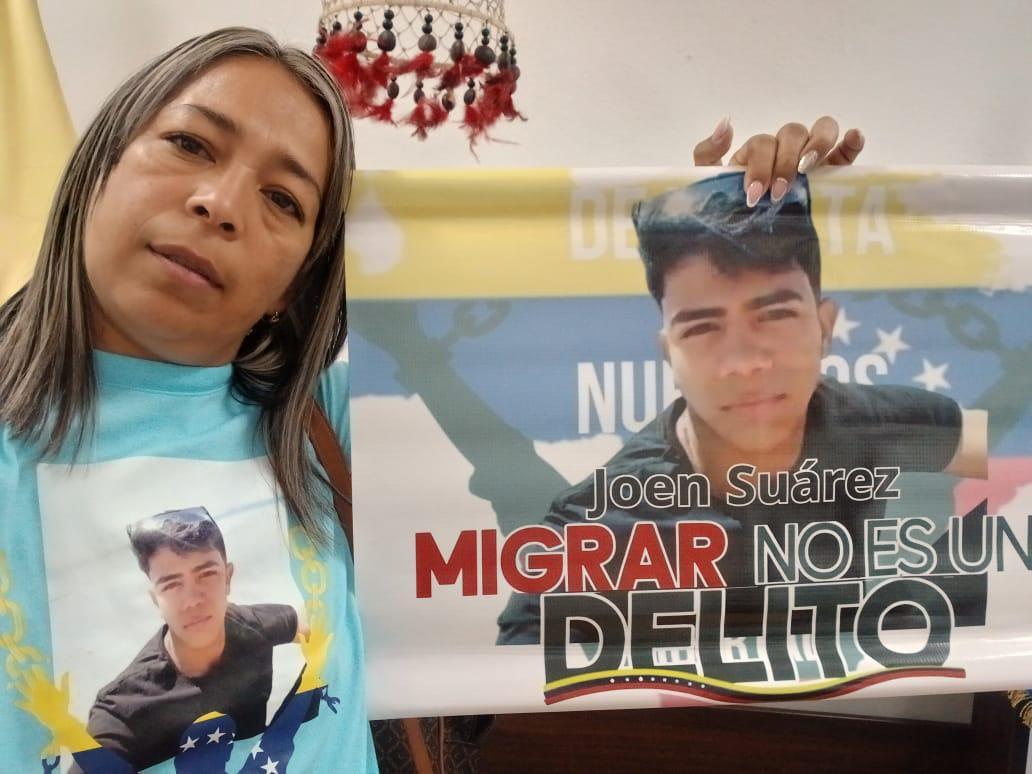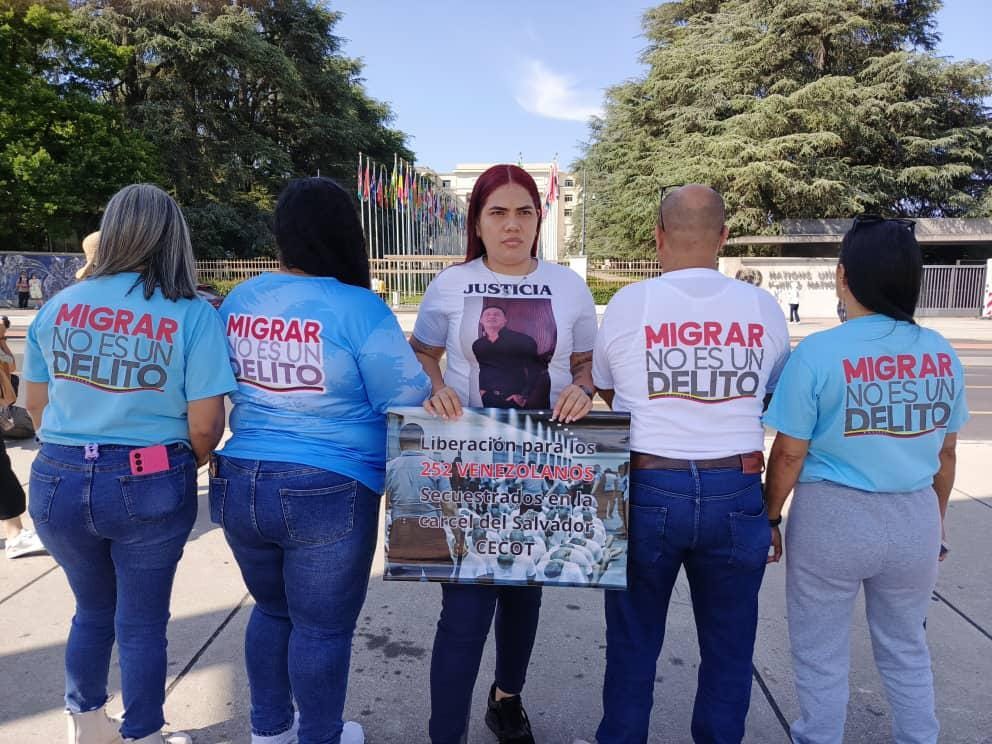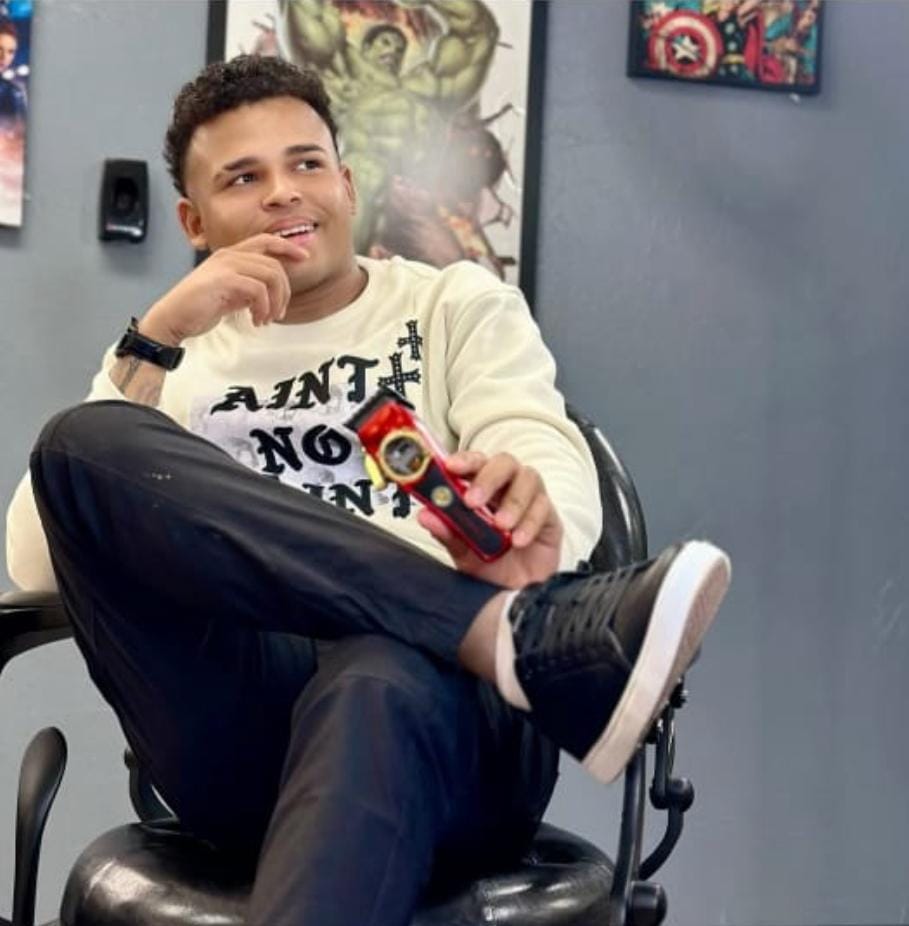
Karlyn Fuentes shows a poster of her son, Joen Suárez (Photo provided by Juan Diego Ramirez for The Latino Newsletter)
Editor’s Note: This is Juan Diego’s reporting debut for The Latino Newsletter. Daily Kos reporter Alix Breeden contributed to the reporting. All interviews were conducted in Spanish and translated into English for this story.
After months of confusion, isolation, and legal limbo, more than 250 Venezuelan men detained in El Salvador have returned home. They were part of a prisoner swap involving 10 American nationals held in Venezuela.
Many parents of the Venezuelan detainees who had sought justice are now breathing a sigh of relief to see their sons home, but remain concerned about the toll the detention has taken on their sons’ lives.
“I saw him. He was not all there,” said Karlyn Fuentes, describing to The Latino Newsletter the moment she saw her son, Joen Suárez, after his return to Caracas last Friday. “Like he had woken up from a dream. He is going to need a lot of mental help.”
Fuentes said the encounter was brief.
Originally from Valles del Tuy, about one hour outside Caracas, Fuentes happened to be at a hospital in Venezuela’s capital city with her daughter, who had suffered a knee injury, when she heard from the news that the prisoners were being flown in.
“I’m very happy,” she said. “As a mother, I don’t want him to return to the United States.”
A few weeks before the news, Fuentes was one of several Venezuelan parents who traveled to Geneva back in June to seek international support.
She and other members of the Comité de Defensa de los Migrantes Secuestrados en El Salvador, a Venezuelan migrant advocacy group, spent over two weeks pleading with the U.N. Human Rights Council to intervene.

Members of the Comité de Defensa de los Migrantes Secuestrados en El Salvador in Geneva (Photo provided by Juan Diego Ramirez for The Latino Newsletter)
Their children were among the 252 Venezuelan migrants sent to El Salvador’s maximum security prison, Centro de Cofinamiento del Terrorismo (CECOT), by the U.S. earlier this year under the use of the Alien Enemies Act of 1798. Many had no prior criminal charges or convictions. Jetzy Arteaga, another Venezuelan parent, stated the transfers to CECOT happened without warning or access to due process.
Arteaga’s son, Carlos Alejandro Cañizalez, was arrested back in March and taken to CECOT by the Trump Administration.
“His partner called me and said they took him to CECOT in El Salvador,” Arteaga said.
Cañizalez was rerouted from a deportation flight to El Salvador with no trial or formal charges.
Arteaga was infuriated with what happened to her son.
“I don’t understand why they are doing things this way. This is a crime against humanity, never before seen, because this has never happened anywhere,” she said.
Before the prisoner swap, El Salvador’s president, Nayib Bukele. publicly shifted responsibility for their detained sons, pointing the finger back to Washington. He addressed the issue directly, explaining that “jurisdiction and legal responsibility” for the Venezuelan men in CECOT rest with the U.S. and not with his country.
Bukele’s statement contradicted earlier comments made by the Trump administration and complicated the legality of the deportations. Legal filings submitted to U.S. District Judge James Boasberg in Washington, D.C. cite El Salvador’s admission that the U.S. retains authority “by virtue of international agreements signed and in accordance with the principles of sovereignty and international cooperation in criminal matters.”
The U.S. government had argued that once the men were flown out of the country, they could no longer challenge their detention.
In June, Judge Boasberg ruled that migrants must be permitted to challenge their deportation even while abroad, and ordered the government to have a system for claims by CECOT detainees.
For Mirelys Casique, the legal nuance doesn’t make up for what her son endured. Francisco García Casique was sent to CECOT after missing a court date in Texas.

Francisco García Casique (Via Mirelys Casique)
“Our relatives were being used essentially as hostages, and that’s my analysis: they were used for a political purpose and ended up in a political limbo where no one gives us answers,” Casique said. “Everyone passes the blame around. It was a hot potato. The United States says it has nothing to do with them anymore because they are in El Salvador. El Salvador says it is only acting as the jailer.”
“We are humble people,” Casique added. “My son is not a terrorist. He is not a criminal in Venezuela or in the U.S. He is just a barber.”
Though the men are now back in Venezuela, the mothers said the story is not over. In videos surfacing online, many of the returnees noted they suffered abuse while at CECOT.
Casique said her advocacy won’t end until every mother in her country has answers they deserve.
“Since this happened, I understood that I had to be the voice of my son, Francisco. But then I also realized I had to be the voice of all the innocent people locked up there, because it’s not just about my feelings as a mother,” Casique said. “I have a moral obligation. I also took on the responsibility to be the voice for the other mothers back home in Venezuela who don’t have the same strength I do.”
Juan Diego Ramirez is an independent journalist whose work explores culture, migration, and inequality.
Finally, a portfolio that's auto-updating, and creates backups of your work.
If you're a writer, journalist or content marketer, you are probably familiar with these struggles:
Spending hours updating your portfolio page to keep it fresh.
Losing your work samples due to site shutdowns.
The good news? Authory has you covered.
It automatically pulls in your content and creates a stunning portfolio that updates itself every time you publish.
Plus, it backs up all your work, so you never have to worry about losing anything.
Ready to impress potential clients and employers?
Help Us Launch Season 2 of Our Podcast
What We’re Reading
Latino Community Center Vandalized: From Fox 32 in Chicago, “Multiple buildings in Chicago's Little Village neighborhood, including a Latino community center and State Sen. Celina Villanueva’s office, were vandalized with swastikas and the phrase ‘ICE rules’ early Sunday morning.”
Consider donating to The Latino Newsletter. Any contribution, no matter how small, helps keep this newsletter free and accessible to all. ¡Gracias mil!




